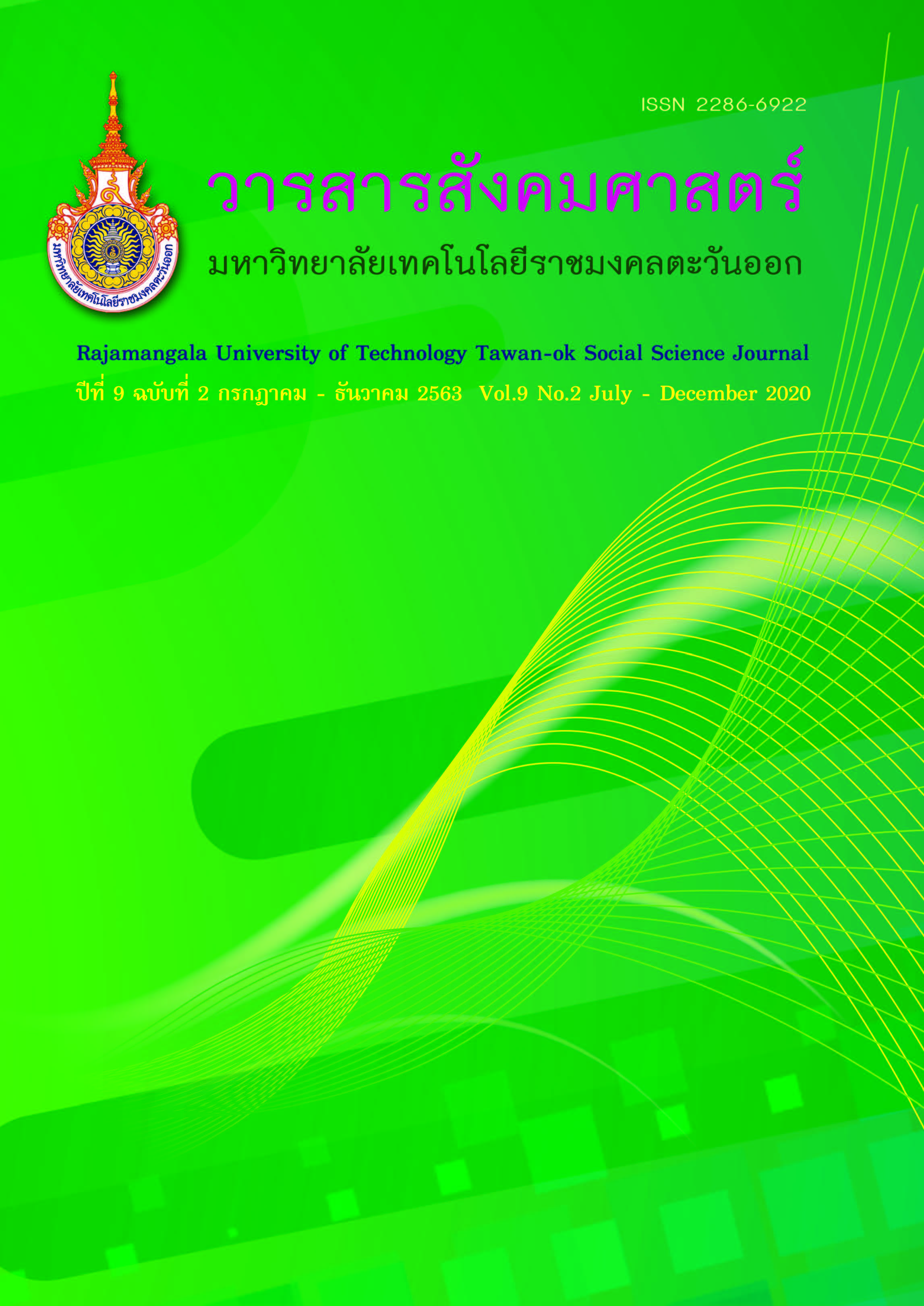The Enhancement of Adolescent Students’ Emotional Control Through Psychological Activity Package
Main Article Content
Abstract
The purposes of this study were to develope a Psychological Activity Package for
enhancing Emotional Control of adolescent students and study the effect of Psychological Activity Package to enhance Emotional Control of adolescent students. The subjects were Adolescent Students in Secondary School, Eastern Part of Thailand. The sample group included 60 subjects Adolescent Students in Secondary School.
The instruments were Emotion Control Test with reliability coefficient 0.98 and Psychological Activity Package for enhancing Emotion Control.
The results of the study were as follows;
- Psychological Activity Package for enhancing Emotion Control is consisted of three stages: the initial stage, the working stage and the ending stage. The counseling theories and techniques based on Psychological Theory and Psychological techniques were applied to enhance the Emotional Control of the adolescent students.
- Statistically significant differences in the total Emotional Control and each components of the Emotional Control in the experimental group which participated in the activity before and after experiment are at .05 level. The results of this study indicated that Psychological Activity Package was a key factor in increasing positive change in the Emotional Control of the adolescent students.
Article Details
How to Cite
Koolnaphadol, P. . . (2020). The Enhancement of Adolescent Students’ Emotional Control Through Psychological Activity Package. Rajamangala University of Technology Tawan-ok Social Science Journal, 9(2), 86–96. retrieved from https://so05.tci-thaijo.org/index.php/SocialJournal2rmutto/article/view/248670
Section
Research Article
References
[1]นวลศิริ เปาโรหิตย์. 2548. รักกันให้ยั่งยืน. กรุงเทพฯ : 108 สุดยอดไอเดีย.
[2]วลัยกรณ์ แพร่กิจธรรมชัย. 2555. ผลของการปรับพฤติกรรมเพื่อลดความก้าวร้าวของวัยรุ่นกลุ่มเสี่ยง.
ปริญญานิพนธ์ กศ.ม. (จิตวิทยาการแนะแนว), บัณฑิตวิทยาลัย, มหาวิทยาลัยศรีนครินทรวิโรฒ.
[3]ศรีเรือน แก้วกังวาล. 2549. จิตวิทยาพัฒนาการชีวิตทุกช่วงวัย (พิมพ์ครั้งที่ 9). กรุงเทพฯ: สำนักพิมพ์
มหาวิทยาลัยธรรมศาสตร.์
[4]Baron, C. S. 1993. Do children with autism recognize surprise. A research note Cognition
and Emotion, 7, 507-516.
[5]Bernard, M.E. 2008. The effect of You Can Do It! Education on the emotional resilience of
primary school students with social, emotional, behavioural and achievement
challenges. Proceedings of the Australian Psychological Society Annual Conference,
43, 36-40.
[6]Blos, P. 1979. The adolescent passage: Developmental issues. New York: International
Universities Press, Inc.
[7]Bono, J. E., & Ilies, R. 2006. Charisma, Positive Emotions and Mood Contagion. The Leadership
Quarterly, 17, 317-334.
[8]Corey, G. 2012. Theory and practice of counseling and psychotherapy (9th ed.). Belmont,
CA Brooks-Cole.
[9]Gazda, G. M. 1989. Group Counseling. United States of America: Library of Congress Cataloging
in Publication Data.
[10]Geldard, D., & Geldard, K. 2005. Basic personal counselling: A training manual for
counsellors. NSW, Australia: Pearson Education.
[11]Hansen, J. C., Warner, R. W., & Smith, E. J. 1980. Group counseling : theory and process
(2nd ed.).Chicago: Rand McNally College.
[12]Roger, D., & Najarian, B. 1989. The construction and validation of a new scale for Measuring
emotion control. Personality & Individual Differences, 10(8), 845-853.
[13]Salovey, P., & Sluyter, D. J. (Eds.). 1997. Emotional development and emotional intelligence:
Educational implications. New York, NY, US: Basic Books.
[14]Silk, J. S., Steinberg, L., & Morris, A. S. 2003. Adolescents’ emotion regulation in daily life:
Links to depressive symptoms and problem behavior. Child Development, 74,
1869-1880. doi:10.1046/j.1467-8624.2003.00643.x
[15]Thompson, R. A. 1994. Emotional Regulation: A theme in search of definition. Monographs of
the society for research in child development, 15(2-3), 25-52.
[16]Wills, T. A., Walker, C., Mendoza, D., & Ainette, M. G. 2006. Behavioral and emotional self-
control: Relations to substance use in samples of middle and high school students.
Psychology of Addictive Behaviors, 20(3), 265-278.
[2]วลัยกรณ์ แพร่กิจธรรมชัย. 2555. ผลของการปรับพฤติกรรมเพื่อลดความก้าวร้าวของวัยรุ่นกลุ่มเสี่ยง.
ปริญญานิพนธ์ กศ.ม. (จิตวิทยาการแนะแนว), บัณฑิตวิทยาลัย, มหาวิทยาลัยศรีนครินทรวิโรฒ.
[3]ศรีเรือน แก้วกังวาล. 2549. จิตวิทยาพัฒนาการชีวิตทุกช่วงวัย (พิมพ์ครั้งที่ 9). กรุงเทพฯ: สำนักพิมพ์
มหาวิทยาลัยธรรมศาสตร.์
[4]Baron, C. S. 1993. Do children with autism recognize surprise. A research note Cognition
and Emotion, 7, 507-516.
[5]Bernard, M.E. 2008. The effect of You Can Do It! Education on the emotional resilience of
primary school students with social, emotional, behavioural and achievement
challenges. Proceedings of the Australian Psychological Society Annual Conference,
43, 36-40.
[6]Blos, P. 1979. The adolescent passage: Developmental issues. New York: International
Universities Press, Inc.
[7]Bono, J. E., & Ilies, R. 2006. Charisma, Positive Emotions and Mood Contagion. The Leadership
Quarterly, 17, 317-334.
[8]Corey, G. 2012. Theory and practice of counseling and psychotherapy (9th ed.). Belmont,
CA Brooks-Cole.
[9]Gazda, G. M. 1989. Group Counseling. United States of America: Library of Congress Cataloging
in Publication Data.
[10]Geldard, D., & Geldard, K. 2005. Basic personal counselling: A training manual for
counsellors. NSW, Australia: Pearson Education.
[11]Hansen, J. C., Warner, R. W., & Smith, E. J. 1980. Group counseling : theory and process
(2nd ed.).Chicago: Rand McNally College.
[12]Roger, D., & Najarian, B. 1989. The construction and validation of a new scale for Measuring
emotion control. Personality & Individual Differences, 10(8), 845-853.
[13]Salovey, P., & Sluyter, D. J. (Eds.). 1997. Emotional development and emotional intelligence:
Educational implications. New York, NY, US: Basic Books.
[14]Silk, J. S., Steinberg, L., & Morris, A. S. 2003. Adolescents’ emotion regulation in daily life:
Links to depressive symptoms and problem behavior. Child Development, 74,
1869-1880. doi:10.1046/j.1467-8624.2003.00643.x
[15]Thompson, R. A. 1994. Emotional Regulation: A theme in search of definition. Monographs of
the society for research in child development, 15(2-3), 25-52.
[16]Wills, T. A., Walker, C., Mendoza, D., & Ainette, M. G. 2006. Behavioral and emotional self-
control: Relations to substance use in samples of middle and high school students.
Psychology of Addictive Behaviors, 20(3), 265-278.


